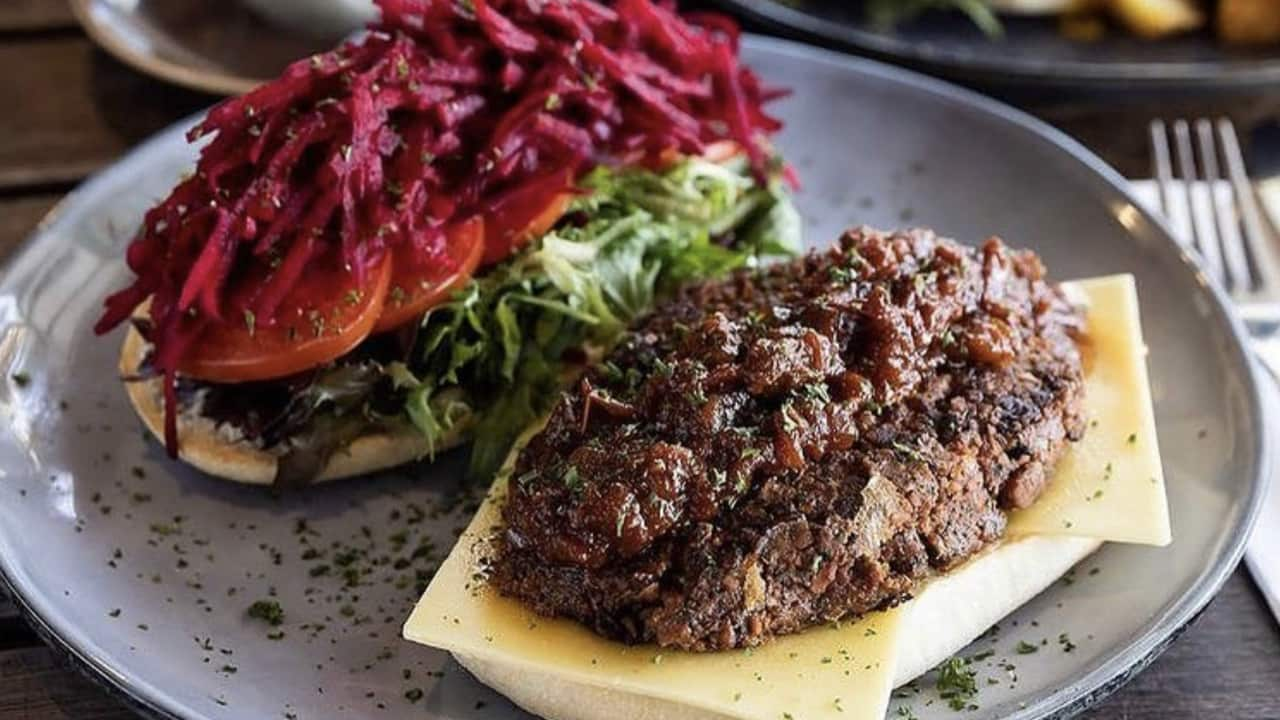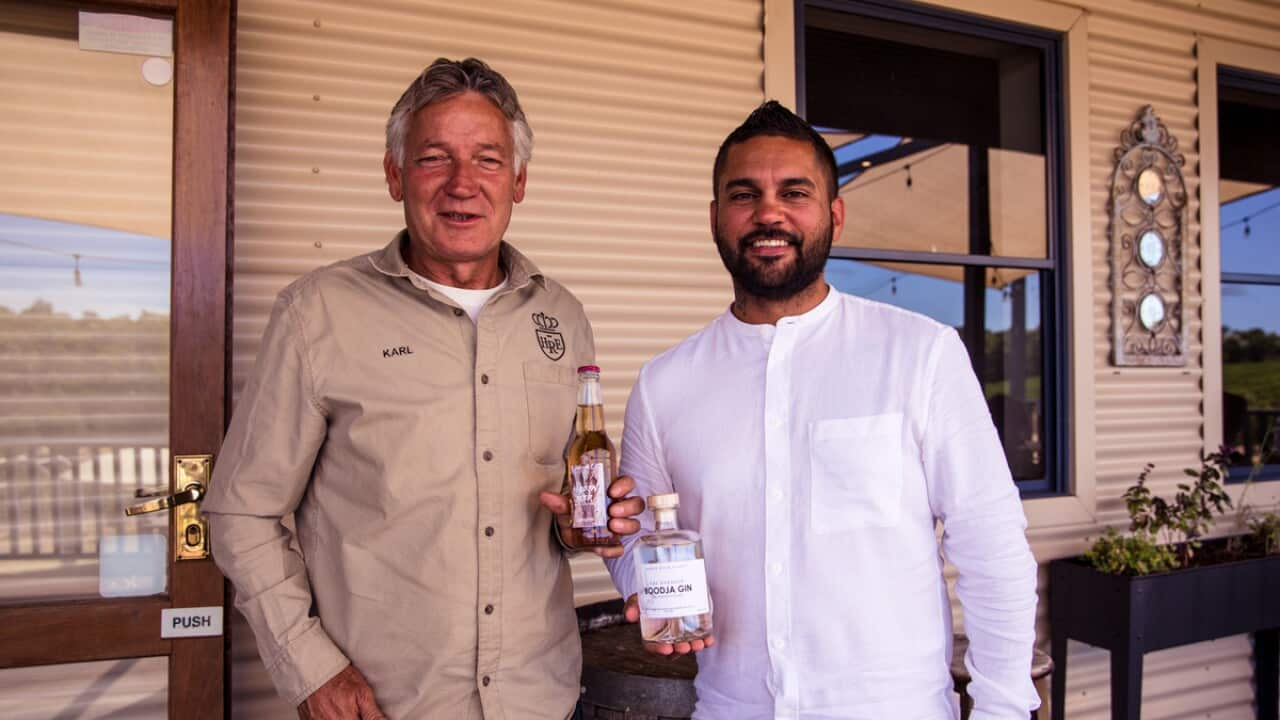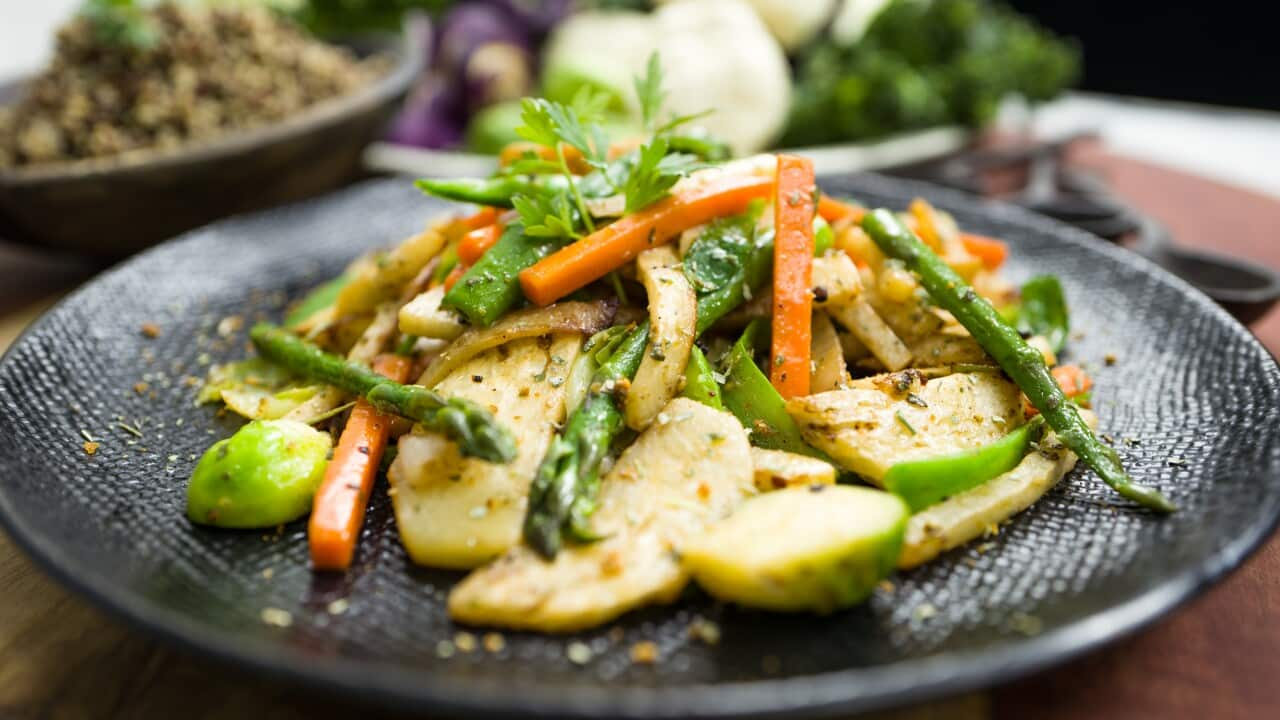NAIDOC Week is a national celebration of Aboriginal and Torres Strait Islander peoples, history and culture, and runs from July 3-10. Join the conversation #NAIDOC2022
As the National NAIDOC Principal Media Partner and official Education Partner, National NAIDOC Week will be celebrated across all SBS channels and platforms, including an exclusive NAIDOC collection of series and films available to stream on SBS On Demand and NAIDOC education resources via .
Nyoka Hrabinsky remembers her childhood in , an Aboriginal community in West Cape York, Queensland. The summer days were dry and the wet season brought intense rainfall. There were many camping and fishing trips with her family — and meals prepared with barramundi, wallabies and swamp turtles.
"They go out and get a big long stick and they poke the holes and grab the turtle out. It's a long-necked turtle. They cook it over the fire," says the co-owner of in Sydney's Glebe.
"It's an acquired taste…The only way I can describe it is as tasty muddy meat," she says and laughs.
Around the age of nine, her family moved back to an Aboriginal community called "on the other side of the mountains of Cairns", she explains. "That's where I'm traditionally from."
She remembers how much she loved rainforest fruits, particularly the ones called maratha, jilarah and blue quandong. Local kids would rush around, seeking these Indigenous ingredients. "We'd be like little bush turkeys underneath the trees, picking the fruits on the ground."
The blue quandong, despite their name, were actually green while they were still growing on trees.
"When it's blue, it falls to the ground," she says. That's a sign that the fruit is ripe and ready to eat. That's when cassowaries usually charge in, to consume them. Locals also eat them, plain and raw. But Hrabinsky remembers putting the blue fruits in a bag, mashing them up with water and sugar, and drinking the rainforest ingredient as a juice.
ABOUT AUSTRALIA'S BUSH FOOD
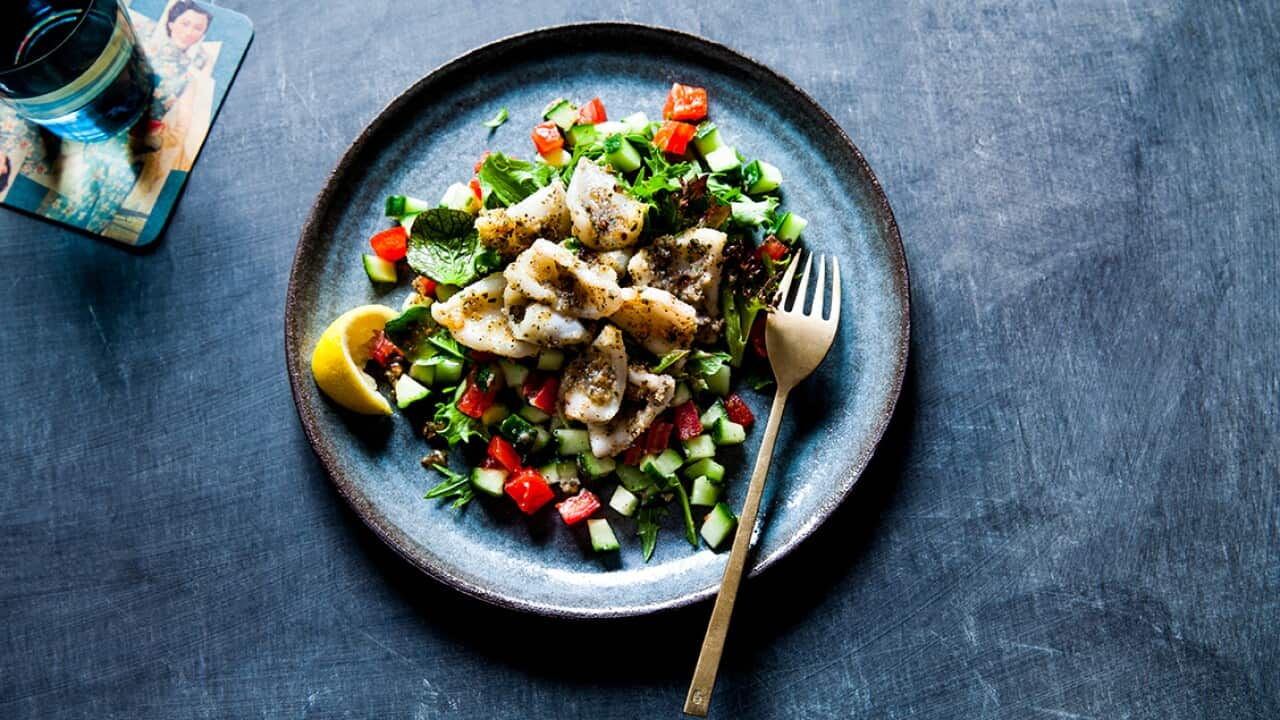
13 recipes that celebrate Australian bush foods
This interest in Indigenous foods, horticulture and the environment led her to becoming a national park ranger. Paying respect to traditional owners was important to her, which is how Hrabinsky ended up working with , the first formally trained Indigenous ethnobotanist in Australia.
"He gives back to our people and the communities. It was interesting working with someone who has a tonne of knowledge in trying to save our culture, our language and our food," she says.
Horticulture also changed her life in another way: It was while studying the subject in Cairns that she met her future husband, Laszio Hrabinsky, who was in the same TAFE class as her.
"He said when he saw me, it was love at first sight. But I didn't notice him," she says and laughs.
In fact, her friend had a crush on him and she encouraged her to ask him out for coffee. But fate had other plans.
"He just asked me to go out one day and we've been together ever since."
Together, they opened The Lillipad Cafe in Sydney in August 2019. It's inspired by the Cairns cafe of the same name where Laszio worked for 15 years. But the couple's business is independent and not a franchise.
For Hrabinsky, it was important to showcase First Nations ingredients on the menu, which is why wattleseed, cinnamon myrtle and macadamia are sprinkled throughout the Desert Island muesli.
Indigenous flavours have appeared on Sydney cafe menus before: in Surry Hills was bolstering coffees with wattleseed and serving riberries with waffles more than a decade ago. Some people might associate native ingredients with fine-dining menus though, so The Lillipad Cafe wants to democratise these bush foods. "We want everybody to experience these flavours, because they are off this land and we should be eating things off this land."
While Hrabinsky is disappointed she can't feature many rainforest ingredients she grew up with — they're not available from suppliers and "it takes a lot of time for the trees to mature" — there is one dish that's highly personal for her.
"The dish from my region is actually the Davidson plum drizzle on the Aunty Suella [brunch dish]," she says. "That's dedicated to my aunty, her name is Aunty Suella."
Hrabinsky recalls how the Davidson plum trees would tower above them in the rainforest: The fruit still green when raw. "When they're ready to eat, they drop on the ground and they turn a black colour. It's really furry, it's got all these needles on the skin. And you can't eat it like that, so you clean the skin — we usually grab a leaf and wipe it."
Once you clear away the silver-like fuzz, the fruit is transformed. "It actually becomes smooth and you can see a reflection. That's how you eat it. The flesh inside is a beautiful red colour. It's a screw-your-face-up sour." But Aunty Suella could handle the pucker and sting of the fruit, no problem.
"She really loves it, she eats it like an apple, so that's why I dedicated that dish to her."
It actually becomes smooth and you can see a reflection. That's how you eat it. The flesh inside is a beautiful red colour.
The Davidson plum is also personally significant because the tree is used to form sea-hunting tools. "It's got two meanings for us."
For Hrabinsky, it’s important that The Lillipad cafe menu is educational.
It's why the kangaroo burger is called the gangurru — the first Aboriginal word that in his journal in 1770.
"It's actually a name. Gangurru is the traditional name for kangaroo in that region," she says. "It's our national emblem, it's everything, but it's not even pronounced or spelt correctly."
By putting the name on the menu, she can tell customers of the word's Indigenous history when they order the burger.
The couple originally conceived of the dish last year, as a response to the January 26 public holiday.
"It took us three months and we worked with a local elder, ," she says. "We wanted to get this burger right to bring it out for Invasion Day."
Hrabinsky put it on the menu for her ancestors: "This is traditional meat from our land, we've got traditional ingredients in it — this is a remembrance day for them."
There were some angry "vegan extremists that didn't like that we sold kangaroo on our menu", she recalls. "Sorry, we were never vegan, we try to do our part to be the most environmentally friendly that we can, but it's an animal from this land, it's so sustainable and it's something that we should be eating."
"We did get a lot of hate for a few weeks, but we also got of support. And the vegan community really came out and supported us, it was amazing."
It might be because The Lillipad Cafe has always been inclusive: every item on its menu, except the salmon omelette, can be adapted to suit dietary requirements. "Everything else can be vegan or vegetarian or gluten-free."
There's even a plant-based version of the gangurru burger, with the vegetable patty seasoned with native ingredients: saltbush, wattleseed and pepper leaf. Laszio, "the mastermind behind the whole menu", has even created a vegan eggs Benedict dish.
For Hrabinsky, who grew up having to fight stereotypes that First Nations people were "just alcoholics sitting under a tree or bludging off Centrelink", it's been important to show a positive side to her community.
"It's really nice to see that perception change and for people to see that we're not like that. We're actually nice, giving people. We're very community-based and community is my comfort, because I grew up in community my whole life," she says.
"Sydney is very new to me and it's a bit too much of a fast city for me, compared to where I'm from. It's really relaxed and chill, and that's what I wanted to create in the cafe," she says. "I feel right at home."
Tuesday–Friday: 7am–4pm
Saturday: 8am–4pm
Sunday: 8am–3pm
NATIVE AUSTRALIA FOOD IN WHICH TO BE PROUD
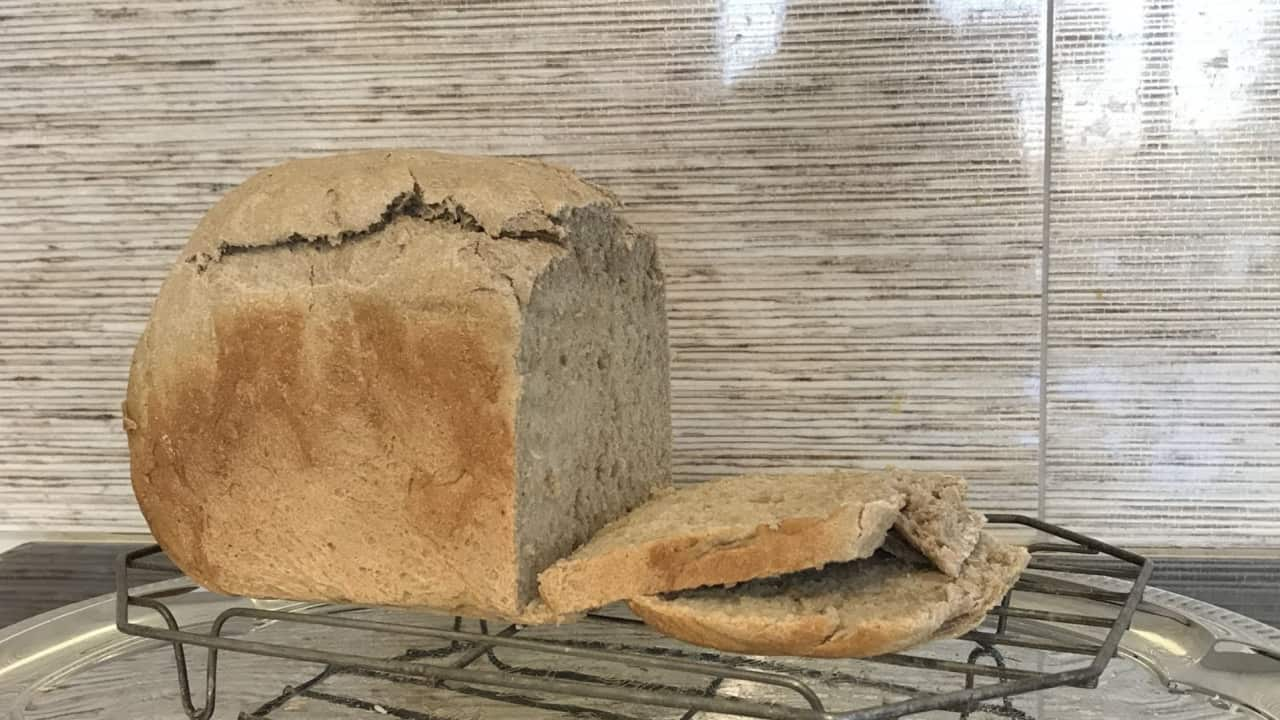
How a humble loaf of bread made from native millet could change lives

